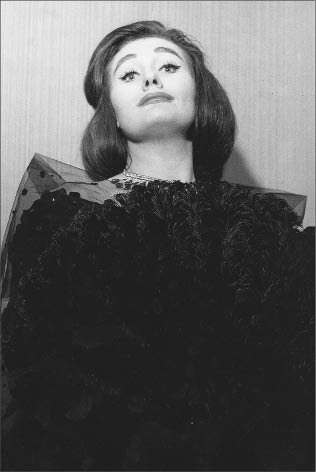Have You Seen
Lotfi's Violetta?

I can truthfully say that my career as an opera singer was attended by few bad reviews — possibly because I specialized in the kind of roles that, if you blinked your eyes, could be easily missed. Nevertheless, I can also proudly proclaim what few others can: I once stepped in for the great soprano Joan Sutherland. This is not a misprint. It was 1964, and I had been engaged to direct La Traviata at San Francisco Opera with Joan in the titular role and her husband, Richard Bonynge, conducting.
By this point in my career I had directed several productions for San Francisco and this much I knew: from day one, I would be fighting a battle against time. Under Kurt Herbert Adler, the company’s general director, full rehearsals — with all performers and technical elements—were doled out in a miserly fashion. I might get a three-hour dress rehearsal for a four-hour-long opera. Yes, I’m exaggerating, but not by much. As you can imagine, there was no room for disruptions. Though, ironically, the one unavoidable disruption was Adler himself. He liked to hover around the director to “help.” I would have my eyes glued on the stage trying to keep track of ten principal artists, forty choristers, twelve supers, eight dancers, set changes, and lighting cues, all the while praying that the performers simply wouldn’t run into each other — only to hear Adler over my shoulder grumbling something vital, such as, “Lotfi, the chorister in the third row — she needs elbow-length gloves.”

Joan Sutherland in costume for La Traviata, 1964.
Photo by Maria De Monte.
La Traviata is all about the soprano, and Sutherland as Violetta was our star. The dress rehearsal started out well enough. But somewhere in the middle of Act One, Richard and Joan got upset with each other. Going in I could tell that they were not their normal selves, and I think all it took was some minor irritant to set them off. Joan was not a temperamental artist, but on this day she walked off the stage and didn’t come back. When she walked off, Richard walked off. But we had to keep going. This was our one and only chance at pulling everything together before opening night.
Alas, we had no cover artist. It was one of those extra expenses that Adler was loath to incur. No matter. It was my practice to memorize the major roles of any opera I staged. I knew Violetta — and I also knew that the only way to save this rehearsal was to do it myself. Everyone chuckled as I made my way to the stage. Violetta is the epitome of feminine vulnerability and beauty, and here I was a nearly bald, somewhat portly man with large black-framed glasses. Needless to say, I couldn’t sing it, though I did mark the vocal part. It wasn’t going to sound or look pretty, but it’s what we had.
The assistant conductor took over in the pit and my assistant went into the house to take notes. The rest of the cast went along gamely. In fact, our Giorgio Germont, played by the impressively unflappable baritone Eberhard Wächter, barely seemed to notice. Eberhard reputedly came from Austrian aristocracy, and this perhaps explains his imperious bearing and aloof nature. Behind his back we referred to him as Herr Graf (The Earl). Throughout all of his considerable interaction with me, the most unlikely Violetta imaginable, he seemed to be the picture of disinterest, not even bothering to make eye contact. That is until the last act. Here, Violetta (me) is in agony, dying of consumption, draped dramatically on a chaise. Eberhard made a suitably solemn entrance. But instead of keeping a respectful distance as directed, he walked right over to the chaise, sat next to me, and placed his palm on my balding head as if taking my temperature. With a look of genuine shock, he made eye contact with me for the first time all night and, keeping a perfectly straight face, gravely muttered, “Oh, Violetta. What’s happened? You’ve been really, really sick. I hardly recognize you.” It was so completely unlike him, executed with such unexpected vaudevillian flair, that I completely fell apart laughing. And, as I was the only one who could hear what he had said, everyone presumed that I was losing the last of my marbles. For the next few days, the joke around the opera house was, “Have you seen Lotfi’s Violetta?” Eventually Joan got wind of it and asked, “Lotfi, should I worry? Have you become my competition now?”
Incidentally, Eberhard, while a pro onstage, did have the unnerving and unbreakable habit of arriving for a performance at the last minute. Adler mandated that artists arrive one hour before curtain — not an unreasonable demand. Eberhard would arrive thirty minutes before his first entrance, which meant that on some occasions the performance started before he walked through the stage door. It drove everyone crazy, but poor Chester Ludgin, who often covered Eberhard, paid the highest price: Adler had him standing by just in case Eberhard didn’t make it. So on many a night Chester would warm up, put on his costume, go through makeup and wigging, and stand in the wings ready to go on. But Eberhard always made it. It takes a lot of mental and physical preparation to get ready for a leading role and Chester did it over and over without any payoff. I always thought of it as operatic coitus interruptus.